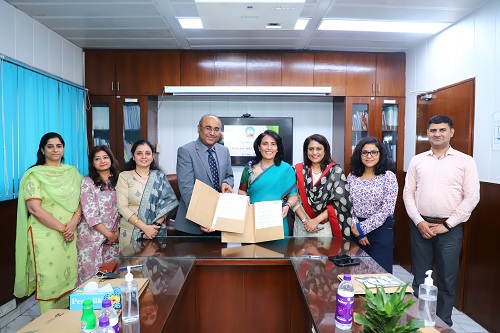Smile Train India, world’s largest cleft focused charity announced a partnership with the National Accreditation Board for Hospitals and Healthcare Providers (NABH) / Quality Council of India (QCI), India’s apex body for accreditation and quality promotion. The partnership includes assessment by the National Accreditation Board for Hospitals and Healthcare Providers (NABH). This will further enhance safety and quality of surgical care supported by Smile Train.
Smile Train India on Monday in Delhi announced their alliance with NABH to ensure enhancement of safety standards for cleft surgical care
NABH/QCI will undertake comprehensive inspections and recommend any improvements before endorsing these facilities across the country.
Speaking about the partnership, Dr Ravi P. Singh, Secretary General, Quality Council of India, said, “Quality Council of India was established to bring a culture of excellence and quality across different sectors in India. We are delighted to note the enthusiasm shown by a non-profit organisation like Smile Train India which already practices high thresholds, to further enhance standards of excellence. We look forward to working together.”
Emphasizing the need for safety and quality at the foundational level, Dr Atul Mohan Kochhar, CEO of National Accreditation Board for Hospitals and Healthcare Providers (NABH) said, “NABH has been established with the objective of enhancing healthcare systems, promoting continuous quality improvement and patient safety. This collaboration with Smile Train will strengthen the cleft care eco-system across the country.”
“Smile Train is honoured to partner with NABH/QCI to improve the quality of health systems at our treatment centres. We are committed to supporting free, safe, quality cleft care to children in need and we are confident that with the help of NABH and QCI, our best practices will scale greater heights,” said Mamta Carroll, Smile Train’s Senior Vice President and Regional Director for Asia.
Cleft Lip and Palate is a treatable birth difference and every year more than 35,000 children are born with clefts in India. With proper guidance and timely treatment, children with clefts can live healthy lives and can attain their full potential. Since 2000, Smile Train India has supported 650,000+ cleft surgeries and essential cleft care across their network of 150+ partner hospitals in India.
About Smile Train India
Smile Train empowers local medical professionals with training, funding, and resources to provide free cleft surgery and comprehensive cleft care to children globally. We advance a sustainable solution and scalable global health model for cleft treatment, drastically improving childrens lives, including their ability to eat, breathe, speak, and ultimately thrive. For more than 20 years, Smile Train has supported safe and quality cleft care for more than 1.5 million children globally, including more than 500K children in India.
To learn more about Smile Train India, please call the national cleft helpline at 1800 103 8301 or visit smiletrainindia.org.
About NABH and QCI
Quality Council of India
Introduction
The Quality Council of India (QCI) is a non-profit autonomous organization registered under Societies Registration Act XXI of 1860 to establish an accreditation structure in the country and to spread quality movement in India by undertaking a National Quality Campaign. QCI works as the National Accreditation Body. It is an autonomous organization under Department for Promotion of Industries and Internal Trade (DPIIT), Ministry of Commerce and Industry.
QCI through its boards and divisions is involved in accreditation and promotion of quality.
The Accreditation & Quality Promotions Boards are:
NABL: National Accreditation Board for Testing and Calibration Laboratories.
NABH: National Accreditation Board for Hospitals & Healthcare Providers.
NABCB: National Accreditation Board for Certification Bodies.
NABET: National Accreditation Board for Education & Training.
NBQP: National Board for Quality Promotion.
The divisions under Special Project Group are:
ZED (Zero Defect Zero Effect)
PADD (Project Analysis and Documentation Division)
PPID (Project Planning and Implementation Division)
NABH
NABH was set up in the year 2005 to establish and operate accreditation program for healthcare organizations in India. The board is being supported by all stakeholders including industry, consumers and government. It has full functional autonomy in its operations. The first accreditation programme “Hospital Accreditation” was launched in the year 2006. Over the years, NABH has developed other accreditation as well as certification programmes based on the need and demand from the industry, government and stakeholders. Few of them are listed below:
Accreditation Programmes:
Hospitals
Small Health Care Organizations (SHCO) / Nursing Homes
Blood Banks/Blood Centres and Transfusion Services
AYUSH hospitals
Eye care organizations
Ethics Committee (Clinical Trials)
Certification programmes:
Entry level certification programmes for Hospitals/SHCOs
Entry level certification programmes for AYUSH Hospitals/SHCOs
Medical Laboratory programme
Nursing Excellence
Besides accreditation and certification programmes, NABH also carries out inspections of Health Care Organizations (HCOs) for the purpose of their empanelment with various agencies. Presently NABH has following empanelment programmes:
CGHS Empanelment programme
ECHS Empanelment programme
Besides the accreditation and certification programmes, NABH also conducts several trainings and educational workshops for its clients and stakeholders.
International Recognition of NABH: NABH Accreditation Standards for Hospitals, 5th edition has been accredited by International Society for Quality in Healthcare (ISQua). This authenticates that NABH standards are at part with the global benchmarks. NABH as on organizational is also accredited by ISQua under its IEEA programme.
Currently more than 10,000 Health Care Organizations have been accredited/certified by NABH in the country.

































